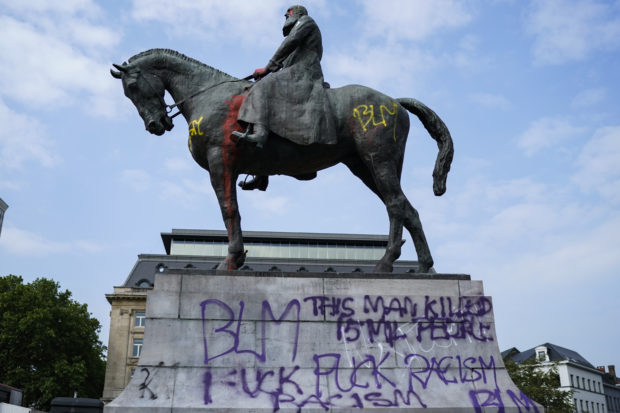
A picture taken on June 10, 2020, shows the vandalized statue of King Leopold II of Belgium in Brussels. – Statues of Leopold have long been a target of activists because of his record of brutal colonial rule in Belgium’s former central African colonies. The movement has gained momentum in recent days after the latest US police killing of an unarmed black suspect triggered a global wave of protest. (Photo by Kenzo TRIBOUILLARD / AFP)
Brussels, Belgium — The wave of protest against symbols of Belgium’s colonial past intensified Friday with at least two more royal statues targeted by anti-racism activists days before the anniversary of Congo’s independence.
The brutal exploitation of Belgium’s former central African colonies has long been a sensitive topic, and the recent wave of protests against police killings in the United States has reinvigorated campaigners.
On Friday, Belgium’s modern royal family was dragged into the fray when a prince defended the record of his ancestor Leopold II, who once owned the then Congo Free State as a personal estate.
Historians say that millions of Africans from areas in what is now the Democratic Republic of Congo were killed, mutilated, or died of disease as they worked on Leopold II’s rubber plantations.
Several statues of the king, who ruled between 1865 and 1909, have been daubed with paint or torn down by protesters in recent weeks, and a petition has been launched for their removal.
And some institutions have removed busts or statues from public view to defuse public anger.
But Prince Laurent, a brother of the present King Philippe and 13th in line to the throne, spoke out in an interview with the SudPresse media group to defend his forebear.
“Lots of people worked for Leopold II and committed abuses, but that doesn’t mean that Leopold II committed abuses,” he said.
“He never went to Congo, so I don’t see how he could have hurt people there.”
The royal palace had no comment on Laurent’s intervention in the debate, and a source close to the family told AFP the crown was considering its position on the “complex matter.”
Meanwhile, overnight, protesters daubed blood-red paint on a bust of another king of the Belgians, Laurent and Philippe’s uncle Baudouin who ruled until 1993, by the cathedral in Brussels.
And in the Auderghem district on the outskirts of the city, a group of activists dismantled a Leopold II statue, filmed by journalists the RTBF public television.
“There are too many symbols of colonialism in Brussels. We’ve been campaigning for years and trying to get our voices heard,” one activist told the camera.
Belgium will mark the independence in 1960 of its Congolese territory on June 30.
Several other European countries face a reckoning of their own with their colonial pasts, spurred by the racial justice movement in the United States following the latest police killing of an unarmed black man.